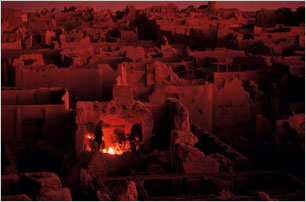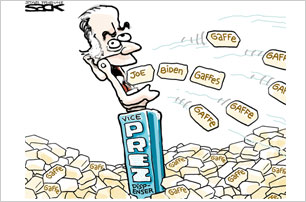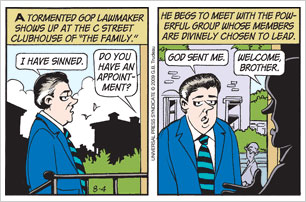
Take Only Photographs, Leave Only CatholesHow to green your camping trip.
Posted Tuesday, July 28, 2009, at 9:22 AM ET Next month, my wife and I are thinking of packing our kids in the car and heading out to the woods for some family time in the fresh air. How can we make sure our camping trip is as environmentally friendly as possible?
Next month, my wife and I are thinking of packing our kids in the car and heading out to the woods for some family time in the fresh air. How can we make sure our camping trip is as environmentally friendly as possible?
Camping is always a green activity—getting out into the natural world helps underscore precisely why conservation and sustainability are such important endeavors. But the last thing you want to do is harm the very environment you've trekked out to appreciate. Green camping, then, is all about getting as close as you can to nature without treading on it too heavily.
The first consideration is how rugged an experience you want to have. In many ways, taking your family to a well-developed campground will be kinder to the environment than striking out into the pristine wilderness. Recreation ecologists have found that the majority of damage caused by campsites—from trampled vegetation to soil erosion—tends to occur within the first several days of occupation, and that it usually takes longer for a site to recover than it does to degrade in the first place. Pitch your tent in a spot that's already seen plenty of visitors, and your own stay will have less of an impact. Plus, well-trafficked campgrounds are more likely to have collection systems for your trash, not to mention established toilet facilities. (Otherwise, prepare to become friendly with the DIY disposal method known as the cathole—unless, of course, you're up for "packing out" your own poop.) If you do decide to take your brood into the backcountry, visit the Leave No Trace Web site for more information on how to do so responsibly.
Wherever you decide to camp, you should plan to leave as little evidence of your visit as possible. You can make that task a lot easier by bringing less stuff in the first place. It might be tempting to burn away any traces of your presence by throwing your paper plates in the campfire. Don't do it! Burning garbage—even paper products—can release harmful pollution, and items often burn incompletely. Whatever you do, don't leave any litter behind: Not only does it pose a danger to wildlife, but it could make subsequent visitors feel more comfortable littering, too.
It's just as important to avoid leaving behind harmful living things. Insect stowaways in imported firewood, for example, can wreak havoc in a new habitat. Invasive species are an especially important problem when it comes to waterways. Anglers can introduce non-native organisms into aquatic ecosystems via their unwashed boots, boats, and tackle. (The Lantern can't think of anything half as sad as whirling disease, a parasite-borne sickness that causes afflicted fish to swim in endless corkscrews.) So make sure to properly clean and dry anything that comes into contact with the water—that includes your dog—before moving on to a new stream or lake.
Finally, while camping is about getting up close and personal with nature, you don't want to get too close with local fauna. This isn't just a safety issue; it's also a matter of maintaining a proper ecological balance. Animals that get too friendly with humans—or, more specifically, with human food—can quickly become dependent on scraps, losing their ability to forage or hunt for themselves. That leaves them in dire straits come winter, when tourists abandon the campgrounds. To prevent this outcome, make sure you store your food securely and dispose of your dishwater, which might contain some stray food particles. If your campground doesn't have a dedicated place for dishwater, strain out any bits of food using a piece of cloth or a plastic bag with a small hole in it and pack them away with your trash. Then scatter the leftover water as widely as possible, staying at least 200 feet from any water source.
No matter how responsibly you behave out in the woods, though, you can easily negate that good work if you're careless about how you get there. Transportation comprises a major part of any vacation's environmental impact, as the Lantern has noted before. So first of all, choose a campground that's close to home. Second, consider your vehicle options. For a family of four, with luggage, a trip in a typical SUV that gets 18 miles per gallon will emit 0.38 pounds of carbon dioxide per passenger-mile. In an efficient car that gets 32 mpg, your emissions will come to 0.22 pounds, and in a 46 mpg hybrid, just 0.15 pounds. The longer your journey, the more those differences add up—so if you're crossing state lines to sleep under the stars, think about renting a more efficient set of wheels.
Is there an environmental quandary that's been keeping you up at night? Send it to , and check this space every Tuesday.
 Shafer: In Defense of Dana Milbank's "Mad Bitch" Video
Shafer: In Defense of Dana Milbank's "Mad Bitch" Video Was There Really Only One Soldier Missing in Action in the First Gulf War?
Was There Really Only One Soldier Missing in Action in the First Gulf War? Better Incentives for Doctors Won't Lead to Better Health Care
Better Incentives for Doctors Won't Lead to Better Health Care The Horror of Whale Sushi
The Horror of Whale Sushi Wars Are Less Deadly Than They've Been for 12,000 Years. Why?
Wars Are Less Deadly Than They've Been for 12,000 Years. Why? Why CNBC's Ratings Are Plummeting
Why CNBC's Ratings Are Plummeting












It is possible to pass through an area, carrying only what you need with you and leaving very little behind to spoil the camping or hiking site. During my involvement with BSA, I and the others who were assistants in the troop tried as best as possible to teach responsible hiking and camping techniques to the scouts under our care. Our experience is that there was much enjoyment in responsible camping.
Rule #1 - Take as little as possible with you. Sort out and discard as much potential waste from your pack and food as possible. This includes outer carton wrappers, canned items and hard plastic items it at all possible.
Rule #2 Exercise extreme caution with fires. There are well established fire rules that hikers and campers are obligated to follow from both fire safety and environmental considerations. Keep a clear area around the fire, fully extinguish and rake the fire then extinguish again, then rake and extinguish again as many times as needed to assure the fire is out and cool to the touch. I have always been a fan of burying my fire area and keeping the fire very small. There is almost never a need for a big fire. Also, never use any wood that must be cut - downed wood makes excellent fire making material. Also, if you don't need a fire, don't light one. Most of the time, a very small fuel powered stove works better than a fire anyway. We have hiked long distances over several days cooking nothing at all, existing just fine on ready prepared foods that we didn't heat. Of course, our intent was to hike and camp not cook.
Rule #3 leaving body waste behind is fine, but bury it, in a small hole, away from water sources and other hikers. You may want to avoid overnight hikes in places where you can't dig a cat hole. If not, be prepared. Carry it out with you if you can't dispose of it.
We always stressed to leave an area not "as good as you found it," but that it was to be left "better than you found it". By this I mean that I seldom go to a place that I don't find at least something that I can carry out with me - Old beer or soda can, aluminum foil, Styrofoam or whatever. Properly exiting camps around streams and lake sites seems to be big problems for many campers - I don't know why, other than they simply don't care. The big offenses seem to be fire sites. There are almost always poorly disposed fire sites that one can return to a more pristine state with a little extra work. Teaching those lessons to the scouts was always a satisfying thing. I know from personal experience that they remember and many of them will continue leaving it better than you found it long after BSA days.
I understand family camping is a different thing. Families might want to stick to "less pristine" family style camps where it is easier to leave the camp as you found it.
I can't imagine who wants to look out across a beautiful mountain lake or down a stream and see a McDonald's Styrofoam coffee cup wedged between two rocks.
-- meridiantoo
(To reply, click here)